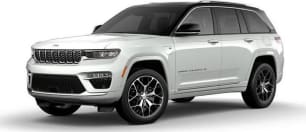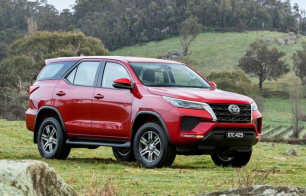On-road, the Fortuner offers up a pretty standard driving experience for a ute-based wagon. It’s on the HiLux ladder-frame chassis, and it has a firm ride, bordering on harsh. Having said that, you do get used to it soon enough and the Fortuner's coil-spring suspension set-up takes most of the sting out of surface irregularities, except for the more severe dips and bumps.
The Fortuner’s driving position offers plenty of visibility – although the A-pillars are bulky and the third-row seats block vision to the rear when they’re folded up to the sides of the cabin.
This 4WD wagon is generally quiet, although there’s noticeable wind-rush noise around the wing mirrors and engine noise builds to a diesel shriek when you use a heavy right boot as is regularly required.
Steering – reach- and rake-adjustable – is adequately light and sharp, and the Fortuner, with its 11.6m turning circle, is reasonably nimble in suburban areas.
Acceleration, from a standing-start or for overtaking, is laggy but available power and torque come in handy during general driving, making the Fortuner more agreeable all-round than previous versions.
The six-speed auto is generally right for the job, but it downshifts harshly, especially when going up or down long, gradually sloping highway stretches. That happens enough for it to be on the wrong side of annoying.
Some aspects of the Fortuner’s driver-assist tech is annoying: active cruise control is too abrupt and pre-emptive, consistently miscalculating the space between the Fortuner and the vehicle in front as accurately as most of its rivals. This clunky application of tech to real-world scenarios works against the Fortuner.
While driving a lightly corrugated and rutted dirt track o the way to our set-piece off-road tests, the Fortuner’s ladder-frame chassis yielded a stiff, firm ride, bashing and bouncing over any and all surface imperfections. Airing down the Yokohama Geolandar ATs (265/65R17) from 38 psi (pounds per square inch) to 26 psi takes some sting out of the ride.
The Fortuner is a very capable 4WD with standard off-road measurements, including ground clearance (216mm), approach angle (29 degrees), departure angle (25 degrees) and rampover angle (23.5 degrees). It has a listed wading depth of 700mm.
The Fortuner’s switchable part-time 4WD system has two-wheel drive (H2), and high- (H4) and low-range (L4) four-wheel drive. There’s ample low-end torque on offer – on tap across a broad rev range – for controlled low-speed 4WDing and the unfussed turbo-diesel engine keeps the Fortuner ticking along, without any hassle.
Engine braking is good, keeping the Fortuner to a sustained and composed momentum on downhill runs.
The off-road traction control system is an effective set-up, limiting wheel-spin and sending much-needed torque to the tyres with some useable traction, with the aim to keep the vehicle moving along at a safe, controlled pace.
Besides that, the driver always has the option of engaging the rear diff lock for more traction action.
Wheel travel is decent for a wagon like this and if you can get the full suspension flex, and drop any mid-air tyres to the dirt for more traction, chances are you’ll be able to get moving along safely soon enough.
So, the mechanicals are fine – its 4WD set-up is very effective – but the Fortuner doesn’t have a whole lot of ground clearance (a claimed 216mm, standard for a contemporary 4WD wagon) and the side steps are prone to hitting on the edges of steep and deep ruts, but those factors are easily overcome through considered driving and tyres that are better suited to off-roading.
The standard Yokohama Geolandar AT tyres are somewhat of a flaw in the Fortuner’s off-roading set-up. Sure, they’re technically all-terrains, but I reckon a better bet for you – if you’re planning to drive anything beyond formed trails – is to invest in a set of more aggressive all-terrains with greater sidewall bite.
If you’re planning to use your Fortuner to tow anything, keep in mind that it has a 750kg unbraked towing capacity and 3100kg braked towing capacity. Remember: to be on the safe side, avoid going loading up to anywhere near those capacity figures.
Payload is 615kg (easily reached when you factor in people, pets, camping gear and more), gross vehicle is (GVM) is 2800kg, and gross combined mass (GCM) is 5900kg.












.png)
















































.png)







































